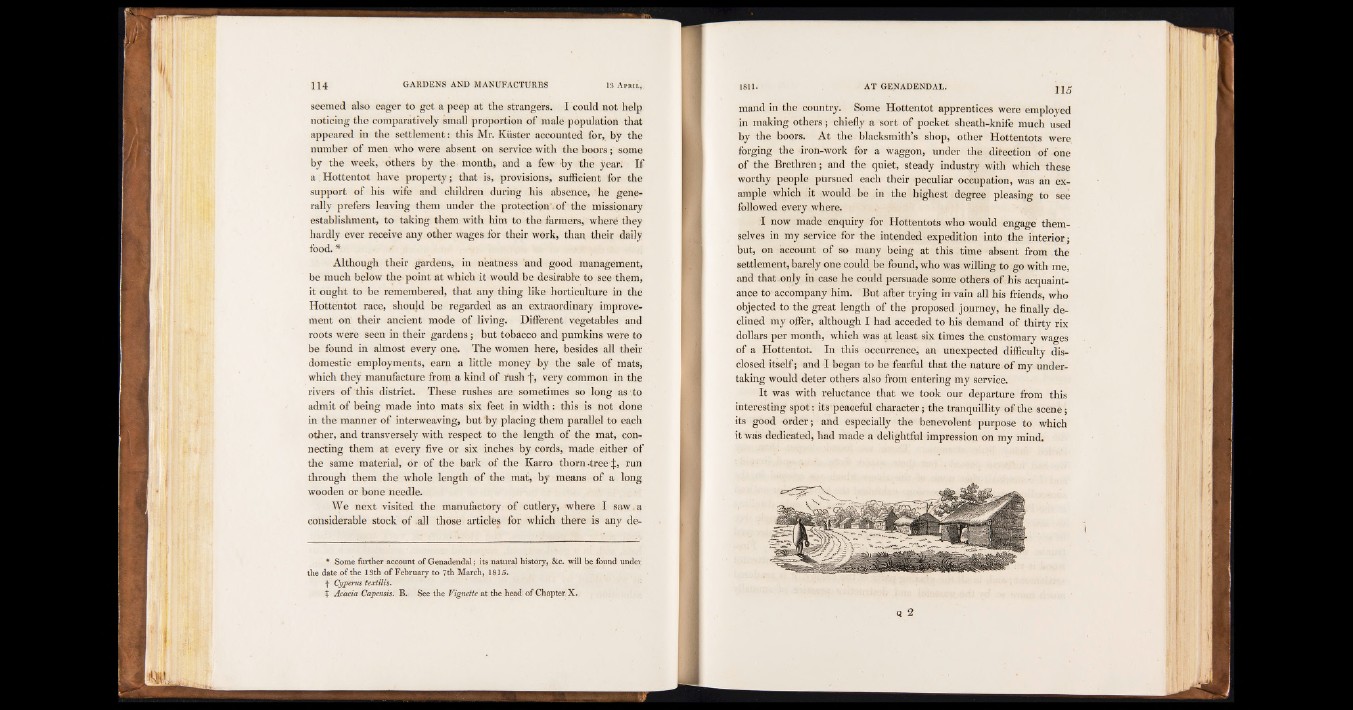
seemed also eager to get a peep at the strangers. I could not help
noticing the comparatively small proportion of male population that
appeared in the settlement: this Mr. Kiister accounted for,, by the
number of men who were absent on service with the boors; some
by the week, others by the month, and a few by the year: If
a . Hottentot have property; that is, provisions, sufficient for the
support of his wife and children during his absence, he generally
prefers leaving them under the protection. of the missionary
establishment, to taking them with him to the farmers, where they
hardly ever receive any other wages for their work, than their daily
food. *
Although their gardens, in neatness and good management,
be much below the point at which it would be desirable to see them,
it ought to be remembered, that any thing like horticulture in the
Hottentot race, should be regarded as an extraordinary improvement
on their ancient mode of living. Different vegetables and
roots were seen in their gardens; but tobacco and pumkins were to
be found in almost every one. The women here, besides all their
domestic employments, earn a little money by the sale of mats,
which they manufacture from a kind of rush f , very common in the
rivers of this district. These rushes are sometimes so long as to
admit of being made into mats six feet in width: this is not done
in the manner of interweaving, but 'by placing them parallel to each
other, and transversely with respect to the length of the mat, connecting
them at every five or six inches by cords, made either of
the same material, or of the bark of the Karro thorn -tree j, run
through them the whole length of the mat, by means of a long
wooden or bone needle.
We next visited the manufactory of cutlery, where I saw.a
considerable stock of all those articles for which there is any de*
Some further account of Genadendal; its natural history, &c. will be found under
the date of the 13th o f February to 7th March, 1815.
f Cyperus textilis.
i Acacia Capensis. B. See the Vignette at the head of Chapter X.
mand in the country. Some Hottentot apprentices were employed
in making others; chiefly a sort of pocket sheath-knife much used
by the boors. At the blacksmith’s shop, other Hottentots were
forging the iron-work for a waggon, under the direction of one
of the Brethren; and the quiet, steady industry with which these
worthy people pursued each their peculiar occupation, was an example
which it would be in the highest degree pleasing to see
followed every where.
I now made enquiry for Hottentots who would engage themselves
in my service for the intended expedition into the interior;
but, on account of so many being at this time absent from the
settlement, barely one could be found, who was willing to go with me,
and that only in case he could persuade some others of his acquaintance
to accompany him. But after trying in vain all his friends, who
objected to the great length of the proposed journey, he finally declined
my offer, although I had acceded to his demand of thirty rix
dollars per month, whieh was at least six times the. customary wages
of a Hottentot. In this occurrence, an unexpected difficulty disclosed
itself; and I began to be fearful that the nature of my undertaking
would deter others also from entering my service.
It was with reluctance that we took our departure from this
interesting spot: its peaceful character; the tranquillity of the scene;
its good order; and especially the benevolent purpose to which
it was dedicated, had made a delightful impression on my mind.